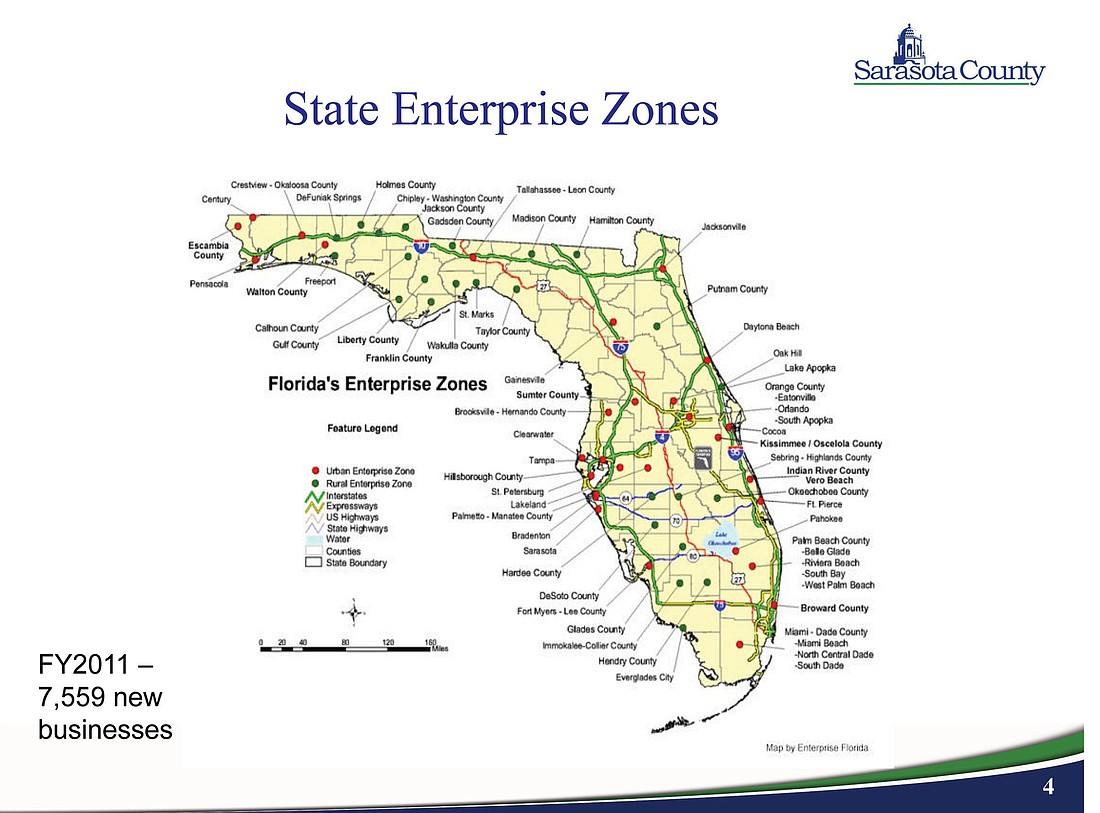- April 18, 2024
-
-
Loading

Loading

After spending more than two hours Wednesday in discussions about a controversial economic pilot program, the Sarasota County Commission voted 4-1 in favor of changes in the proposed ordinance for the program and asked staff to return with the document for another public hearing Feb. 22.
The county will have to approve the ordinance by March 1 to continue its participation as one of only two local government bodies in the state allowed to work on it. State officials selected Sarasota County and the city of Miami in 2009 to host the pilot program.
The Energy Economic Zone Pilot Program, which would encompass one-third of the county, has been designed to lure clean-energy businesses to areas that need an economic jolt.
Among the changes they agreed to for the ordinance, the commissioners set the county’s official EEZ boundaries. The pilot program area will include the 7,000-acre Central County landfill and 1,000 acres along State Road 681, east of U.S. 41. The latter site once was considered a location for a Jackson Laboratories biomedical village.
The boundaries also include major employment centers within the county’s urban service area. Any municipality in the county that has adopted an urban service area opt-in will be part of the program as well.
The majority of the commission agreed upon those parameters.
“There are a lot of unanswered questions here,” said Commissioner Jon Thaxton, “and I would rather keep the definition of boundaries as narrow as possible … Once some of the fears are satisfied, we can expand (the EEZ zone) at a later date.
Commissioner Joe Barbetta, a strong proponent of the program, disagreed and pushed unsuccessfully for a larger area for the zone at the outset.
“I want anything that encourages redevelopment of our urban areas,” Barbetta said.
The commission also tweaked the ordinance’s definitions of “green businesses” and “clean technology.”
The clean-technology sector is defined as manufacturing businesses with processes that harvest renewable materials and produce less waste.
Eligibility criteria for an EEZ company were modified, too, to clarify that companies must offer at least five clean-technology jobs and at least 10 jobs in the green-business sector, if they want to apply for inclusion.
The commission approved the changes by a 4-1 vote, with only Chairwoman Christine Robinson voting against the motion.
Robinson said she disagreed “with the direction the commission was taking” the program.
“I don’t think we’re encouraging development, especially with the energy standard we’re providing,” said Robinson, noting she believed the changes also required businesses to adhere to Florida energy-code requirements that were too difficult to achieve.
The commission did adopt a minimum Energy Star rating for buildings.
During the meeting Wednesday, residents and local attorneys continued to voice concerns about the eligibility criteria.
Cathy Antunes, speaking as a representative of the Sarasota County Council of Neighborhood Associations Inc., said the CONA board has reservations about the program, but its members were happy to discover the zone would not be targeting retail and residential areas of the county.
“We ask you to recognize and protect local constituents from bad unintended consequences,” Antunes said. “We want a sound disciplinary program that addresses foreseeable problems, and we ask you to think of businesses you won’t be rewarding with these subsidies.”
Not all of those who made public comments criticized the program, however.
“It’s an honor to be picked as one of only two pilot sites in the state, and we need to move forward,” said Greater Sarasota Chamber of Commerce President Steve Quieor.
EEZ Pilot Program Requirements
Applicants interested in a new Energy Economic Zone (EEZ) Pilot Program will be rated using a scoring system that contains the following components:
• Number of new full-time, permanent green jobs created
• Average wage of employees
• Commitment to local procurement
• Comparison of clean-technology practices versus Green Business modes
• Number of transportation strategies/fleet emissions in place
• Land-use qualifications
• Solid-waster reduction/recycling plan in place
• Number of water management/conservation strategies in place